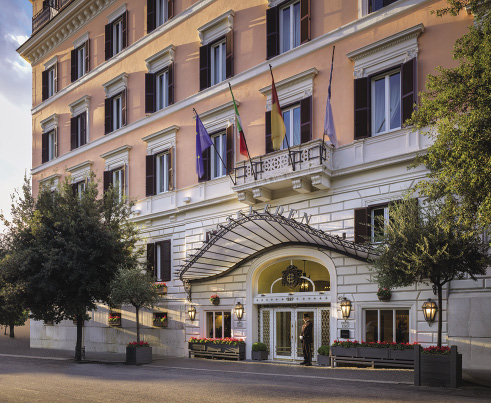


![]()
ONLINE

A Clear Vision
Editors’ Note
In 2007, Christopher Cowdray was appointed Chief Executive Officer of Dorchester Collection. His vision is to create the ultimate hotel management company, which now comprises 10 hotels in Europe and the Americas. He has an extensive international career managing hotels in Africa, Asia, Australia, the Middle East, and London.
Company Brief
Dorchester Collection (www.dorchestercollection.com) manages a portfolio of some of the world’s most celebrated hotels including The Dorchester and 45 Park Lane in London, Coworth Park in Ascot, Le Meurice and Hôtel Plaza Athénée in Paris, Hotel Principe di Savoia in Milan, Hotel Eden in Rome, Le Richemond in Geneva, The Beverly Hills Hotel, and Hotel Bel-Air, which recently underwent 24 months of extensive renovations.
What has helped Dorchester Collection perform so well?
It started with five individual iconic hotels, behind which we set a clear vision to become the ultimate international hotel management company.
With that clear vision, and an outstanding team of leaders working with me, we’ve been able to grow the brand along with the reputation.
What our hotels stand for is now widely recognized not only within the hotel industry, but also within the travel industry. This has given us momentum, because we now have the full infrastructure of a large management company to be able to add further hotels to the brand.

Hotel Bel-Air, Los Angeles
Is growth focused on specific markets or is it where opportunity presents itself?
We have a clear plan as to where we’d like to be within the U.S., Europe, the Middle East, and Asia. This is primarily in key gateway cities. If opportunities arise outside of that, we would complement the current portfolio and if it would appeal to a clientele that uses our hotels, then we would consider it.
What makes a hotel restaurant successful, and how challenging is that in certain cities?
First, the restaurant has to appeal to the local community.
If you get it right, these restaurants work very well, and they add a lot of value to the hotel – people are looking for the overall experience, and that’s what we’re trying to accomplish.
Will you offer a consistent branded spa or will the spas reflect the particular properties in which they’re housed?
We work with different providers like Dior or La Prairie, but we also have very successful spas under the names of the hotels.
There has been a shift from the guests wanting a single brand to wanting a variety of products. Guests are used to choice so when they go to a spa, they want a choice of not just one product line but of a variety dependent on their preferences and allegiance to brands.

Hotel Eden, Rome
Is success today about personalized service and what creates that special guest experience?
It’s about the personalized service; it’s also about recognition – guests like to be recognized. They also like efficiency of service. It also comes down to the feel and touch of the environment; it’s the style or decor, so it’s how everything is brought together.
Service plays a high component in this, but it needs to be excellent service coupled with the right environment.
In terms of hiring, what are the key factors in having new employees fit into your culture?
The service culture has to be embraced from the top, so it’s mandated in the vision and then it’s cultural. There has to be a strong service culture, which is clearly articulated through the hotels.
Leadership is very important so we spend a lot of time inspiring our leaders into how to effectively motivate our employees.
Finally, it’s service training. If you’re recruiting the right people, you can train them.
The attitude of the back-of-the-house people is also vitally important in terms of delivering your frontline service.
Where is the travel market today? Has it come back to the level you had hoped?
It has come back to the 2008 levels. World economies are improving, in particular in emerging markets. Consequently, the demand for luxury travel will increase.
How important is your investment in technology, and is it a concern that the high-touch will be challenged?
Technology enables effective service. We invest heavily into technology within the company as a whole, which is providing the global networks, including the property management and reservation systems.
In the hotel, it’s how fast you can deliver Internet. However, technology will still never take away the importance of the interaction with the staff.
You have iconic properties with great name recognition. How are they tied into the collection from an awareness perspective?
They are individual in name, but we bring them closely together under the collection because the cross reference of clients among the hotels is also very important.
Today, people are looking at brands, and if they have a fantastic stay at one hotel and see there are others in the same brand, they will be influenced to select them as well.
Would you talk about how the Dorchester Collection Fashion Prize is tied into the brand?
Four years ago, we were looking at some PR activity that would benefit the hotels but also put value back into the community.
It came from the couture world. Our iconic, individual hotels, have all been closely associated with fashion, with major designers staying in them or launching their brands within the hotels – so it seemed a good fit.
We’ve been able to help young people who want to be recognized for the work they’re doing. But the prize has also enabled them to grow their businesses and make an impact.
You were recently awarded the Lifetime Achievement Award at the European Hospitality Awards. How special was that award for you?
I was very honored to receive that award, and it did give me an opportunity to reflect on the collection and my career.
As far as the collection, we got to where we are today because of the great group of people I have working with me, who have been on this journey with me.•